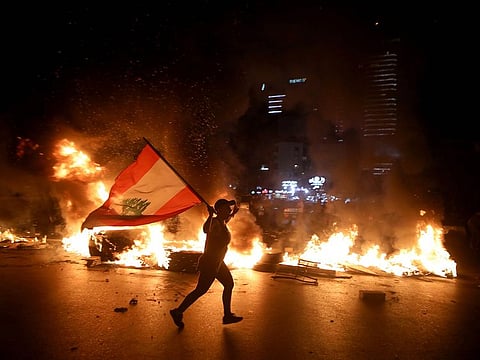Global powers pledge $298 million for Lebanon after Beirut blast
The blast destroyed the main port and damaged more than 200,000 homes.

Also In This Package
World leaders pledged almost $300 million to support the Lebanese people in the wake of last week's deadly explosion that destroyed large parts of Beirut and unleashed a new burst of protest against a ruling class many blame for the country's downward spiral.
More than two dozen countries joined a virtual donors' conference Sunday co-hosted by French President Emmanuel Macron and the United Nations. The participants pledged to bring together "major resources" in the coming weeks to address the needs of Beirut and its people. But they also urged the government to enact deep reforms to unlock broader financial support for an economy already in freefall before the blast destroyed the main port and damaged more than 200,000 homes.
Repairs are likely to cost billions of dollars that the government, which is bankrupt and in bailout talks with the International Monetary Fund, can't afford.
In a strongly-worded statement at the end of the conference, IMF director Kristalina Georgieva said months of talks with Lebanon had "yet to yield results" as politicians and bankers remained divided over what needed to be done.
She set out four conditions for talks to move forward:
"Commitment to these reforms will unlock billions of dollars for the benefit of the Lebanese people," she said. "This is the moment for the country's policymakers to act decisively. We stand ready to help."
The country's stock exchange opened Monday for the first time since the explosion, with investors focusing on Solidere, the real-estate company that rebuilt downtown Beirut after the civil war that ended in 1990. The shares, which trade in U.S. dollars and had become a hedge against surging inflation and a sliding currency, slumped as much as 13% before recovering most of the day's losses.
The area developed by Solidere, once full of high-end boutiques and some of Beirut's most exclusive homes, has been heavily damaged in the blast.
Outrage over the Aug. 4 explosion is running high, with protesters taking to the streets to demand regime change and the resignation of the government of Prime Minister Hassan Diab.
Corruption and mismanagment
Three decades after the end of the of a 15-year civil war, the country remains divided along sectarian lines and mired in its worst financial meltdown in decades. The government, backed by the pro-Iranian militant Hezbollah group and its allies, has struggled to carry out reforms demanded by the international community as the price for a financial bailout.
The currency has collapsed, driving inflation into double digits and wiping out life savings. Rampant waste and mismanagement at the state electricity company means it is able to provide only a few hours of electricity a day and garbage is left uncollected on potholed streets.
A banking crisis and the coronavirus pandemic had left businesses struggling to stay afloat even before the blast, and the economy is expected to shrink dramatically this year.
The tragedy, caused by an explosion of chemicals stored at the city's main port, killed more than 150 people, injured 6,000 and left some 300,000 homeless, igniting fury among Lebanese who blamed politicians for gambling with the safety of the capital city and its people. Protests against the government's role in the devastating blasts turned deadly on Saturday, contributing to the resignation of two Lebanese cabinet ministers.
Volunteers have poured in from across Lebanon to help with the clean-up, clearing glass and debris and helping survivors trapped by rubble as security forces looked on. The state offered little in the way of guidance or support to residents affected by the blast and speeches of leaders appeared aimed mainly at shifting blame. Diab has promised to propose early elections on Monday, as way out of the crisis.
Macron, who toured the devastated neighborhoods last week, pledged that the aid would go direct to the people and not to the government. As donors pledged 252.7 million euros ($298 million) for emergency relief, he urged political leaders to make political and economic changes to unlock further assistance.









